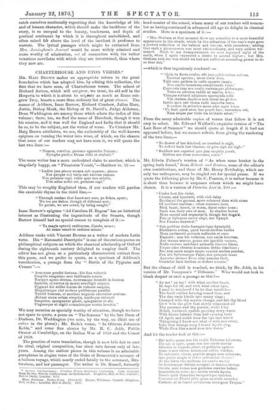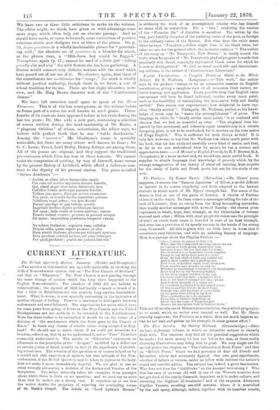CHARTERHOUSE AND ETON VERSES.*
• Septum Carthatianum : Floribus Triton Seculoruni Conte.rlum. Cum Gulielmi Haig Brown. Scho]® Carthusian• Archididascali. Deighton, Bell, at Soc., Cantab.; Bell et Da]dy, Londini. 1870.
Num Ptonensa. Series Nova. 1796-1833. Etonze, Williams ; Cantab., Deighton, Bell, et Soc.; Loud's'', Bell et Daldy. 1860. Ma. HAIG BROWN makes an appropriate return to the great foundation which has adopted him, by editing this collection, the first that we have seen, of Charterhouse verses. The school of Richard Sutton, which will outgrow, we trust, its old self in the Hesperia to which it is about to migsate as much as Rome out- grew Troy, boasts a more than ordinary list of great alumni. The names of Addison, Isaac Barrow, Richard Crashaw, Julius Hare, Jortin, Bishop Monk, the Bishop of St. David's, Judge Alderson, Dean Waddington are among those which adorn the index of this volume ; there, too, we find the name of Havelock, though it was his mission, and it was well for England and India that it should be so, to be the subject, not the writer of verse. To Crashaw Mr. Haig Brown attributes, we see, the authorship of the well-known epigram on turning the water into wine, of which, on the chance that some of our readers may not have seen it, we will quote the last two lines
Numen, convivm, pramens agnoscito Numen ; Nympha pudica Daum vidit at erubuit."
The same writer has a more undoubted claim to another, which is singularly happy, on " Piscatores Vocati,"—Matthew iv. 19 :—
"Ludite jam pieces secure sub a3quora; pieces Nos quoque sed varia sub ratione sumus. Non potuisso capi, vobis apes una salutis, Una salus nobis est, potuisse capi."
This may be roughly Englished thus, if our readers will pardon the execrable rhyme in the third line,—
" Through realms that know not care, yo fishes, sport ; We too are fishes, though of different sort : Ye perish, we are saved, by being caught."
Isaac Barrow's epigram "Ad Carolum II. Regem" has an historical interest as illustrating the ingratitude of the Stuarts, though Barrow himself had no special reason to complain of it :-
" Te magis optavit rediturum, Carole, nemo ; At nemo sensit to rediisse minus."
Addison ranks with Vincent Bourne as a writer of modern Latin verse. His " Barometri Descriptio " is one of the curious poems on philosophical subjects on which the classical scholarship of Oxford during the eighteenth century delighted to employ itself. The editor has not given us a particularly characteristic extract from this poem, and we prefer to quote, as a specimen of Addisou's versification, a passage from the " Battle of the Pygmies and Cranes ":—
" Armorum pendet fortune; his fixa volucris Cuspide sanguineo ease furibunda rotatu Torquet agens circum, rostrnmque intendit in hostem Imbelle, et curves in morte recolligit ungues. Pygmad hic stillat lentus de vulnere sanguis, Singultusque ciet crebros pedibusque pusillis Tnndit humum, at moriens nngnem execratur acutum. /Estuat omne solum strepitn, tepidoque rubescit Sanguine, sparguntur gladii, sparguntur at also Unguesque et digiti commistaque rostra lacertis."
We may mention as specially worthy of attention, though we have not space to quote, a poem on " The Seasons " by the late Dean of - Durham, Dr. Waddington (we note, by the way, an illicit use of rabies in the plural); Mr. Bode's verses, " In Obitum Johannis Keble," and some fine alcaics by Mr. R. C. Jebb, Public Orator at Cambridge, on the Italian War of 1859 and the Comet of 1858.
The practice of verse translation, though it now bids fair to oust its rival, original composition, has risen into favour only of late years. Among the earliest pieces in this volume is an admirable paraphrase in elegiac verse of the Duke of Brunswick's account of a balloon voyage, which nearly ended fatally to the aeronaut, Mrs. Graham, and her passenger. The writer is Dr. Russell, formerly head-master of the school, whom many of our readers will remem- ber as having continued in advanced old age to delight in classical studies. Here is a specimen of it :—
"Mrs. Graham at that moment drew my attention to a most beautiful appearance in the clouds, which by the refraction of the sun's rays gave a perfect reflection of the balloon and the car, with ourselves ; adding that such a phenomenon was most extraordinary, and very seldom wit- nessed. Much to my disappointment, we soon regained sight of the earth, when I again expressed a desire to ascend higher ; but Mrs. Graham said she was afraid we had not sufficient asoeuding-power to do so that day,"
—which is thus ingeniously rendered :-
"' Quin to flecto oculos, ubi jam pulcherrima unborn,
Exornat species ; utere aorta data. Talia rare quidem in ccelis apparet imago, Non cuivis hominum conspicienda vault.'
Conversis turn nos oculis currumque globurnque, Nube ex adverse reddit ut umbra, note ; Vivaque ref racti admirer's spectacula soils Viz credam duplices non Bimini ire globes. Invite mox sub visum redit improbe terra, Scaudore in retherios mons avet atgra locos. ' Ut fieri, quod eves, bac possit hoe, verendum eat, Nam neque par yetis via levitatis adeat.' "
From the many admirable copies of verses that follow it is not easy to select. Mr. Edward Walford's exquisite version of " The Last Rose of Summer" we should quote at length if it had not appeared before, but we cannot refrain from giving the rendering of the two lines,— "No flower of her kindred, no rosebud is nigh,
To reflect back her blushes, or give sigh for sigh:" "Reddere nee suporest qure jam suspiria possit, Risibus ant rises consociare, sorer."
Mr. Edwin Palmer's version of "As when some hunter iu the spring bath found," from Zulirab and Rustunt, some of the editor's own contributions, and those of Mr. Henry Nettleship, which are only too unfrequent, may be singled out for special praise. If we quote the following piece by Mr. C. Pearson, it is rather because it is short than because it surpasses others which we might have chosen. It is a version of Paradise Lost iv. 700 :- "Under foot the violet,
Crocus, and hyacinth, with rich inlay Broider ed the ground, more coloured than with stone Of costliest emblem ; other creature hero, Bird, beast, insect, or worm, durst enter none ; Such was their awe of man. In shadier bower More sacred and sequester'd, though but feigu'd, Pan or Sylvanus never slept, nor Nymph Nor Faunas haunted :"
" Sub pedibus viola) ferruginoique byacinthi Distinxere solum, quod versicoloribus herbis More pavimenti gemmis radianlis at auro Emicuit : non his volucres, non sascla ferarum, Aut tenuos mums, genus ant ignobile cermet., Nulla sacrum audebaut animalia vincero limon, Usque adeo obtutus hominum defixa timebant ; Nee non sacra mangle neque °peeler umbra patebat, Pan ubi Sylvanusque Pater, sex quiequis Mani Agreatos animos Deus olim numine lusit, Gaudebat lassi levibus so dedero somnis."
But the climax of skill is reached, we think, by Mr. Jebb, in his version of Mr. Tennyson's " Tithonus." Who would not look in blank despair at such a passage as this 7—
" Ay me ! ay me ! with what another heart,
In days far off, and with what other eyes, I used to watch—if I be ho that watch'd- The lucid outline forming round thee, saw The dim curls kindle into sunny rings ; .Changed with thy mystic change, and felt thy blood Glow with the glow that slowly crimsoned all Thy presence and thy portals, while I lay Mouth, forehead, eyelids growing dewy-warm With kisses balmier than half-opening buds Of April, and could hear the lips that kise'd Whispering I know not what of wild and sweet, Like that strange song I heard Apollo sing, While Ilion like a mist rose into vision."
And let the reader look at this :— " Hai mibi, quam non his oculis Tithonus iubwrens, Ills ego ai Spiro, quam non hoc cords tuebar °liner° to cingens jubar, at pallentis apricos Stare cornis cirros, miramque subize videbar, To subeunte, vicem, penitus magis case calescene, Quo peons magic at rubor ardescebat oborhe ! At tua labra tuo crebrum irrorantia nectar Os frontenique dabaut resupini at lumina circum Oscula, quis verna3 non germina suavius halant Semireducta roue; nec secius osoula figens, Nescio quid dementia inexpertique canobas, Crescere sic Phcold plus quam mortals) recorder Carmen, at in tunes nebulosam assurgere Trojan." We have two or three little criticisms to make on the volume. The editor might, we think, have given us with advantage some more stops, which often help out an obscure passage. And he should have made, or cause to be made, some corrections of positive solecisms which now disfigure two or three of the pieces. On p. 39, frigus penetrans is a wholly inadmissible phrase for " penetrat- ing cold ;" the absolute use of penetrans is a blunder for which, as the phrase runs, a " fifth-form boy would be flogged." Triumphans, again (p. 47,) cannot be used of a little girl " telling proudly o'er and o'er " the wild flowers she has been gathering. A Roman would connect very definite notions with the word which have passed out of our use of it. We observe, again, that three of the contributors use modularnina for " songs ;" the word is wholly without poetical authority, though there is, we know, a sort of school tradition for its use. These are but slight blemishes, how- ever, and Mr. Haig Brown deserves well of the " Carthusiana domus."
We have left ourselves small space to speak of the Musie Etonenses. This is of the less consequence, as the volume before us forms part of a series too well known to need praise. Three- fourths of its contents have appeared before at intervals during the last ten years ; Dr. Oke adds a new part, containing a selection of verses written during the head-mastership of Dr. Keate, a " plagosus Orbilius" of whom, nevertheless, the editor says, we believe with perfect truth that he was " valde desideratus." Among the " auctores " Mr. Gladstone's name is specially noticeable, but there are many others well known to fame ; Sir 0. C. Lewis, Praed, Lord Derby, Bishop Selwyn are among them. All of the poems are original, and they support the traditional pre-eminence which Eton has won iu these honours. We cannot resist the temptation of quoting, by way of farewell, some verses by the present Bishop of Lichfield, which afford a ludicrous con- trast to the dignity of his present station. The piece is called " furum Academia ":— " Audiat, et afloat juboo furunculus onanis, Cui cure est noatno mysteria discere fraudis, Qui, simul atque ;etas artus duravorit, ipso Callidior forsan meliorque parento ferotur. Vollero jam zones, ditesque secure crumenas Voa juvat, at loculis faciles immittero palmas. Nobiliora sequi juboo ; vos ipso docebo Fumri qua lege at qua retinue quoatis Imprimis levibus digitis pedibusquo latroni Est opus; inde oculia at acutia naribus ; mutes Previte habeat seneus ; priosens in pastors semper Sit mans; impavidum prudentia temperet ausum.
No subeat thalamos ; argentoa vase, cullulos Eripiat cella, quam sognis promus, in alto Dum etertit thalamo, plerumque relinquit apertam Dein priedam avertat tacitus, nil pone relinquat Per quod prodatur ; grav is est jactura latronis."



































 Previous page
Previous page